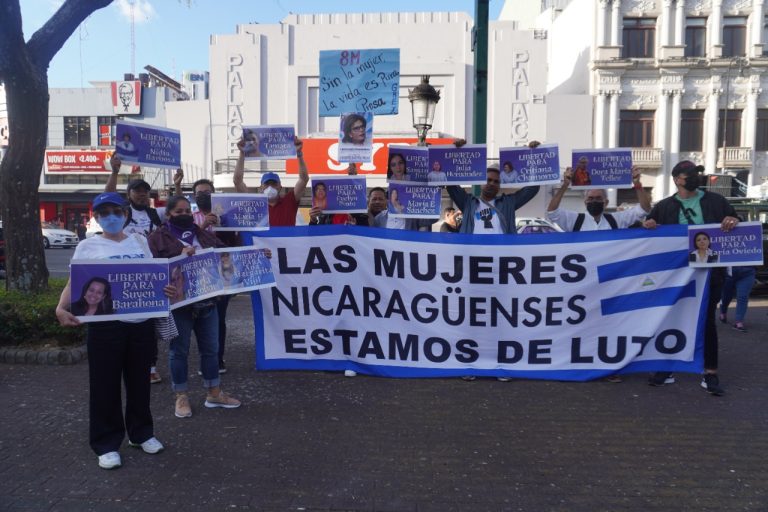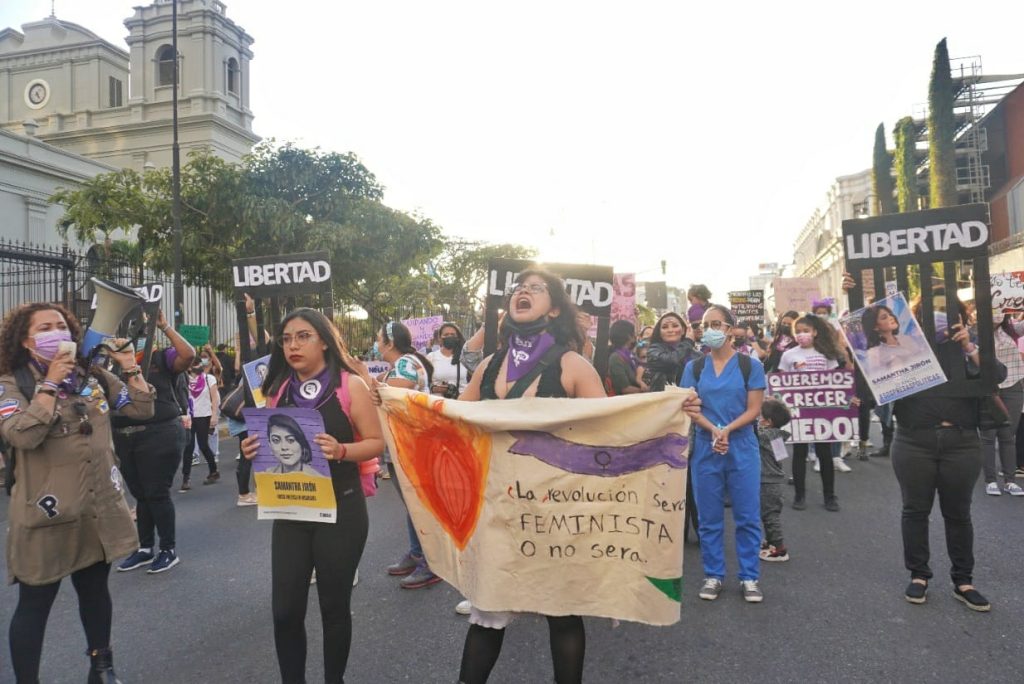14 de marzo 2022

Children of Exile: The Births “Sowing Hope” in the Camp of Nicaraguan Farmers

PUBLICIDAD 1M
PUBLICIDAD 4D
PUBLICIDAD 5D
Relatives of the political prisoners addressed the panel, denouncing the mistreatment and the different types of torture suffered by the prisoners

Feminists from different countries “shouted out” on March 10th for the 14 women opposition leaders who are currently political prisoners in Nicaragua. Their aim was to pressure for the women to be freed.
The demand for freedom for the Nicaraguan dissidents was expressed during an online panel entitled: International Feminist Tribunal for the freedom of the female political prisoners in Nicaragua.” Activists from a number of different European and American countries participated, along with relatives of the imprisoned women.
There are currently 176 political prisoners in Nicaragua, of which 14 are women. Their ages range from 22 to 70. Specifically, those being held are: Ana Margarita Vijil; Cinthia Padilla; Cristiana Chamorro; Dora María Téllez; Eveling Pinto; Julia Hernandez; Karla Escobar; María Esperanza Sanchez; María Fernanda Flores; María Oviedo; Nidia Barbosa; Suyen Barahona; Tamara Davila; and Violeta Granera.
“I share with you the demand for the total freedom of these women, and of all the political prisoners in Nicaragua,” declared Eva Zetterberg, Swedish ambassador to Nicaragua from 2003 – 2008. At one time, the government of Daniel Ortega accused her of interfering in internal affairs.
“We’re following the crisis in Ukraine, but that doesn’t mean we can forget the situation of other suffering peoples. Knowledge of these 170+ political prisoners, among them 14 women, is a credible indication that Nicaraguans are truly living in a dictatorship,” she asserted.
US writer Margaret Randall, author of the book Sandino’s daughters,called the situation of Nicaraguan women “titanic”, especially those who are “unjustly imprisoned, their only crime being to advocate for justice and peace.”
According to Mary Ellsberg, director of the U..based Global Women’s Institute, Daniel Ortega was already in the process of closing off democratic spaces and dismantling gender politics in Nicaragua since before the popular uprising that broke out in April 2018.
“We already saw how the government was beginning to close off the democratic spaces and to dismantle all the programs and policies for confronting gender violence. In 2018, with the April revolution, they ended the programs completely,” said Ellsberg, who spent 30 years studying gender violence in Nicaragua, until 2017.

Relatives of the imprisoned dissidents denounced before the panel the poor treatment and different types of torture their family members suffer, including total isolation, artificial lighting 24 hours a day, or being kept in permanent semi-darkness in their cells.
In addition, these women prisoners suffer repeated interrogation sessions; they’re forbidden to have reading and writing materials; they’re subjected to insults, blows, threats, poor nutrition, and lack of medical attention. As a final cruelty, they aren’t allowed visits, photos or letters from their young children.
Alda Facio, who directs the “Woman, Justice and Gender” program of the UN’s Latin American Institute for the Prevention of Crime and the Treatment of Offenders, concurred that “these women are illegally and arbitrarily imprisoned.”
She warned that Ortega, along with Rosario Murillo, his wife and vice president, could be tried for “Crimes against Humanity”.
“The violation of human rights is also a crime against humanity. The [presidential] couple will not be able to defend themselves by claiming they weren’t the ones doing the torturing, since instigating or benefitting from these tortures makes them participants,” Alda Facio argued.
Activist Zoilamerica Narvaez is the daughter of Vice President Murillo. Twenty-four years ago, Zoilamerica disclosed that Daniel Ortega, her stepfather, had sexually abused her, and denounced him for rape. At the Tribunal, she lamented the harm that this “unjust” imprisonment will inflict on the victims and on the next generations, but expressed optimism about the future of the jailed.
“Nicaragua isn’t alone. This concert of women is here. May the love coming from Nicaragua embrace our political prisoners and give them the strength to keep going forward during this very dark moment of history,” she concluded.
This article was originally published in Spanish in Confidencial and translated by Havana Times
PUBLICIDAD 3M
Agencia de noticias internacional con sede en Madrid, España. Fundada en Burgos durante la guerra civil española en enero de 1939.
PUBLICIDAD 3D